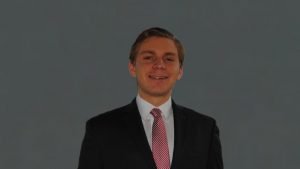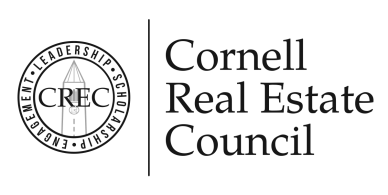Cornell Real Estate Club Hosts the Cornell Real Estate Council Advisory Board

George Sotelo, CREC Intern 2020-2021
On September 24th, the Cornell Real Estate Club hosted the Cornell Real Estate Council Board of Directors, including Douglas Weill (Hodes Weill & Associates), Paul Rubacha (Ashley Capital), Jenny Wang (Blackstone), and Lynn Gray (Campus Scout). The panel hosted by the Cornell Real Estate Club President, Emily Wu, came together to speak about their backgrounds, the effects of COVID-19 on the real estate industry, and how to pursue a successful career in the industry.
Diverse Backgrounds and Unique Journeys Into Real Estate
Paul Rubacha started the conversation by sharing his background of coming into Cornell as an architecture major who would go on to change his major to economics after one year as he “wanted to be closer to the economics of real estate rather than the design.” Out of school, Rubacha spent his next 12 years across an array of financial institutions where he worked on the fiduciary and principal side of the industry. But, given his strong entrepreneurial spirit, he decided to start Ashley Capital, where for the past 35 years, he has focused on warehouse and distribution space acquisitions.
Then, Doug Weill, who graduated from the Hotel School in 1988, spoke on his interests from a young age to enter the restaurant industry, which then shifted to an interest in real estate through an array of hotel appraisal and feasibility internship experiences. As Doug continued to gain experience, one of his most significant career achievements was founding an institutional capital raising group at Credit Suisse. He later left with a couple of colleagues to start Hodes Weill & Associates.
Jenny Wang spoke next and commented on her goal to be on the hospitality industry’s operational side, which was later transformed into an interest in finance and real estate through her coursework. Upon graduation, Ms. Wang joined the real estate team at Blackstone, which she has been a part of ever since.
Lastly, Lynn Gray, who was a student at the Cornell Law School, had to convince a family of doctors who were skeptical about lawyers that law school was the right place for her. Her career in real estate began while she was a corporate lawyer and helped a family friend with a real estate legal issue that would later become a long career in real estate finance. Given her passion for campus recruiting, after the Great Recession, Ms. Gray started Campus Scout which aims to help firms who do not have large recruiting teams attract the best talent.
Experiences with Mentorship
All panelists spoke about the importance of mentorship in the real estate space and how it has impacted their perspective careers. One of the takeaways Paul Rubacha gained from his mentor was a particular piece of advice, “look back to get some perspective on what you have done in the past and what you can improve on going forward. But never dwell on what you have done or mistakes you have made on your career in the past.” On the other hand, while Doug Weill could not pinpoint one mentor, he mentioned how he has “learned something from everyone he has worked with; you learn something from everyone you work with, things you can do better and things you may want to avoid.” Agreeing with Mr. Weill’s point, Ms. Wang mentioned how it is hard to pick only one mentor as she has taken advice and has become inspired by an array of people throughout her career. In terms of the most critical piece of advice she has received in her career Ms. Wang strongly believes in the importance of “staying calm and positive,” which is routinely expressed by her boss Jonathan Gray.
The Impact of COVID-19 on their Day to Day
The conversation then shifted towards the effects of COVID-19 and how it has impacted Mr. Rubacha and Ms. Wang’s roles in real estate acquisitions. Ms. Wang began by speaking about how the logistics/industrial space has picked up during the pandemic as e-commerce has boomed while people have stayed home. On the other hand, she mentioned how COVID-19 has created uncertainty in the market and how it will create uncertainty around the rest of the asset classes. In terms of advice, Ms. Wang recommended students to “take a longer-term view” towards a career in real estate as COVID-19 is not here to stay, and instead, students should take advantage of the ever-changing circumstances.
Mr. Rubacha mentioned that the most significant change in his role is the ability to travel as he believes that being on property is imperative to understanding the asset. Notably, he mentioned how he had made two business trips in the past six months, a significant drop-off from the past year. Like Ms. Wang, Mr. Rubacha also confirmed the newly found popularity in the industrial asset class during the COVID-19 pandemic.
After the panelists who work in acquisitions roles shared their insight, Mr. Weill shared how COVID-19 has affected the real estate industry’s advisory side. He emphasized that he and his firm needed to go further in terms of serving clients as the need for advice increases in markets like this. Firms are always looking at what capital is looking to do, and for that reason, Hodes Weill & Associates needs to be “ears to the market.”
The last panelist, Ms. Gray, spoke on the effects COVID-19 has had on recruiting processes across the leading real estate firms. What Ms. Gray found interesting was that most clients have already completed their hiring for summer 2021 and have continued hiring. In providing recommendations, Ms. Gray said that she would recommend students take this opportunity to network (use the Cornell Real Estate Council alumni network!) and research how companies have reacted to the COVID-19 pandemic.
Succeeding as an Analyst
Mr. Rubacha began the conversation on how a positive attitude is an essential characteristic of a successful incoming team member. Mr. Weill agreed with Mr. Rubacha but added the importance of communication and how he particularly appreciates personalized interview follow-up emails, which help create connections with potential candidates. Ms. Wang provided her perspective by underscoring the importance of Argus and emphasizing the need for soft skills mentioned by Mr. Rubacha and Mr. Weill. Ms. Gray closed the question with three points, “have a friend read your resume, don’t include non-relevant skills on resume, be aware of what is going on within the firm you are interviewing for, and the general market.”
Final Advice to Current Students
Mr. Weill shared advice guided towards both under and upperclassmen, which focused on networking efforts with professionals closer to your age group instead of those 20+ years out of school. Ms. Gray pushed students “to be calm, don’t panic as there are firms that are overwhelmed…especially consulting firms.” Mr. Rubacha told students to get a subscription to Forbes, the Wall Street Journal, or Business Now to get a basic understanding of Corporate America and trends in the industry. Lastly, Ms. Wang recommended students to be flexible, “even something that wasn’t something you thought you wanted to do take a chance at it.”
With the panel coming to a close, panelists concluded on the importance of not panicking and taking this opportunity to improve resumes and networks. To connect with more employers and fellow Cornell students and alums in real estate, sign up for the Cornell Real Estate Council!
Note: Article written by George Sotelo, CREC Intern 2020-2021.




